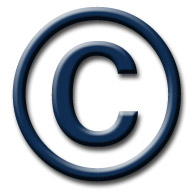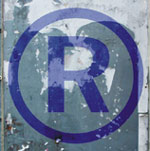Copyright Law
Copyright law protects the owner of an original work,
the moment such a work has a physical presence - i.e. it is recorded and or in a material form.
This protection is automatic, no application for protection is required and no registration of the work is necessary - in most instances.
Computer programs, web pages, songs, films and TV programs, written material, sound recordings, artwork and photographs are examples of material protected by copyright law.

The legal owner of the work is normally the creator of the work.
There are exceptions - generally:
- If the work was created in an employment situation within the course or scope of the job, in which case the employer owns the work;
- Where the work was commissioned such as the taking of photographs, painting of a portrait, making of a film or sound recording, work from freelance writers etc. and where the work forms part of a collaborative project.
Purpose of Copyright Law
Copyright law protects the intellectual effort invested in the creation of the work. It grants the owner the right to:
- benefit commercially from the work;
- control the way the work is being used; and
- legal action in case of infringement of these rights.
Free Copyright Forms and Related Copyright Information:
- Copyright Infringement - An Overview
- Moral Rights - Recognized Separately to Copyrights
- Copyright Laws and Internet Plagiarism - Remedies Against Content Thieves
- Copyright Forms - An Overview of the Letters available and Links to External Resources
- Cease and Desist Letter Guidelines - Options, Advantages and Possible Outcomes
- Plagiarism and Copyright Infringement on the Internet - Sample Cease and Desist Letter to an Infringing Webmaster
- Internet Copyright Infringement - Sample Notice of Infringement to Web Hosts and Domain Registrars
- Copyright Protection - Sample Notice of Infringement to Search Engines
- Cease and Desist Letter - General Purpose Sample Letter
- Assignment of Copyright - Guidelines and a free Template
Copyright attorneys should be consulted before granting any licenses or signing away any of your rights.

How to Claim your Copyrights
It is important to put either the word "Copyright" or the international symbol - © - with your work, so someone else cannot claim ignorance of your rights. The standard format is to display the symbol (or the word(s) copyright / copyright reserved), the date the work was created and the name of the legal owner:
© 2005 Jane Doe
or: © 2004-2008 Jane Doe (as in the case of a frequently updated website)
To create the copyright symbol, hold down the Alt key and type the numbers 0169 i.e. Alt+0169 or Option+g on a Mac or use the html code & copy; (without the space).
Registration of Copyright - Do You Need to Register Copyright?
For most countries in the world there is no requirement to register copyright. The extent to which copyright can be registered also varies internationally. For example, in the United States and Canada virtually all work can be registered, in South Africa only copyright on films can be registered, whereas in the United Kingdom and Australia there is no registration available.
However, anyone from around the world can register their work in the United States - registration is handled by the Library of Congress' Copyright Office and can be done online. Registration is generally just a means to facilitate proof.
The World Intellectual Property Organization (WIPO) clearly states that works are protected automatically and this principle applies in all countries party to the Berne Convention - see a list of the member countries. Therefore, if your country is party to this Convention, the same rights you have in your country will be honored by other member countries.
Copyright law in the United States stipulates that registration is required before an infringement suit may be filed in court. The damages awarded can also be more for registered copyright if registration was within 3 months after publication of the work or before infringement occurred (statutory damages and legal fees).
Some unofficial services exist to record your copyright. You need to investigate their fees charged and whether they will act as independent witness in the event of legal action. Consult with your copyright attorney for advice on how to record proof of your work to make it legally admissible.
How Long does Copyright Last?
The lifespan varies according to the copyright law of different countries. It can last anything from 50 to 70 years after the death of the author (creator) of the work or even longer for "made for hire" work.
Copyright is an intellectual property and like any other property it can be bequeathed in a Last Will and Testament. Should there be no will, the normal intestate laws will apply. The ownership of copyright can be transferred or assigned (sold) and should be done so by written contract.
You are here:




